Natasha, Pierre & The Great Comet of 1812
Dave Malloy
Shotgun Players
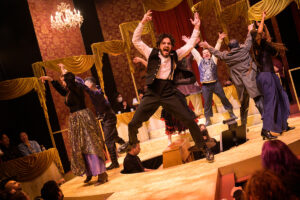
Having opened November 15, 2022, Shotgun Players’ audience-immersive, modern-sounding opera set in a Russian cabaret setting of 1812 – Natasha, Pierre & The Great Comet of 1812 by Dave Malloy – has already received the highest of accolades from both my fellow critics and especially from ecstatic, oft-sold-out audiences. Having been out of the country during much of the run, I feel especially lucky that previously announced, must-close dates kept getting pushed out, with the latest and last extension now ending on February 25, 2023.
To have missed this grandiose, eye-popping, and glorious-sounding production would have been a huge regret for me as it should be for any Bay Area lover of unique, theatrical experiences. Among the long list of what makes the Shotgun Players production a must-see is its combination of an intriguing story of Natasha’s doomed love affair and Pierre’s desperate search for meaning in his life (based on seventy pages of Part 8 of Tolstoy’s classic, War and Peace); a magnificent, telling of the story with the music being a mixture of classical, Russian folk, indie rock, and electronic dance (all sung, save one spoken line between the two title characters’ only scene together); and a staging where dancing and singing cast members and those playing instruments wind in and around audience members sitting only inches away. For the precious, few chances remaining to experience Shotgun’s Natasha, Pierre & The Great Comet of 1812, the decision to go should be a no-brainer.
Immediately, we as audience are pumped up by the opening “Prologue” where both story (“There’s a war going on out there somewhere and Andrey isn’t here”) and each of the principles are introduced in fabulous, choral harmonies that are marked with much humor. Each character is assigned an adjective (e.g., “young,” “good,” “old-school,” “hot,” “slut,” etc.) and a cast-choreographed hand signal (a raised middle finger for “slut,” for example). After each new introduction, all previous others are repeated in “Old MacDonald” style with increasing speed, intensity, and volume. The effect is an audience literally cheering its approval and its readiness for the story to begin.
Russia in 1812 is under attack by Napoleon, but the war seems quite removed from the battles about to ensue within this small segment of Russian society populated by princes and princesses, counts and countesses. Moscow is atwitter about the arrival of Countess Natasha Rostova who is madly in love and betrothed to Prince Andrey Bolkonshy, “who isn’t here” (being away on some battlefield). Natasha is accompanied by her most-faithful friend and cousin, Sonya, both of whom are to stay with the dame of Moscow society and Natasha’s godmother, Marya Dmitrievna. Andrey has asked his best, older friend, Count Pierre Bezukhov, to keep a watchful eye on Natasha until he returns; but the Vodka-loving Count is both unhappily married to a promiscuous Hélenè and is suffering from major depression because he feels his life is meaningless.
Into Natasha’s life enters the brash, cocky, and handsome son of Pierre, Anatole (his opening number’s adjective is appropriately ‘hot’). Moscow society’s big spender on wine and women sets his eyes on his next conquest, Natasha, who becomes a too-easy conquest by a man she does not realize is already married. And thus, the stage is set for a story we already can see – like many of the more classical operas of old – is likely not to end well for any involved.
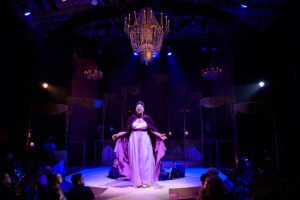
To a person, the cast could hardly be better, individually or collectively, for this particular set of characters and for the demands of such varied musical styles. As Natasha, Jacqueline Dennis has the widest range of demands to deliver vocally and emotionally; and she delivers with beautiful notes of clarity that denote in their varied tones the ecstasy of girlish youth, the surety of promised love, the sudden infatuation with a surprise lover, the anger of others’ reactions, and the depression of being denied any love due to her own naivite and disloyalty. When she first sings of her love for Andrey (“No One Else”), the lift and lilt in her voice try to assure her and us that it is “you and I and no one else;” and yet there is something in the shadows of her loveliest of tones that is a warning when she sings, “I’ll never be this happy again.”
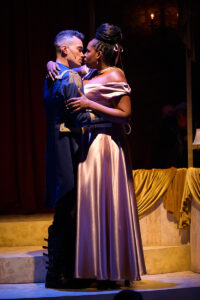
The bright, airy notes of that song about Andrey become more foreboding even as she is singing of her newly discovered attraction for Anatole after they meet at the opera. When she sings, “I feel closer to you than I ever felt with any other man” (“Natasha and Anatole”), we as audience want to say, “Really … what about Andrey?” Immediately, after this initial encounter with her new love, Jacqueline Dennis gives one of her strongest among many powerful moments as she has a musical duel with herself (“Natasha Lost”), fighting between her feeling of “I am lost” because of her possible betrayal of Anatole and of her feeling of infatuation for “that bold handsome man who pressed my arm.” The juxtaposition of her emotions that fill the notes she sings is striking and memorable.
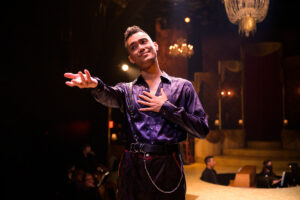
To the part of Anatole, Nick Rodrigues sports a voice whose tenor-embedded edges can cut through the air to command attention and admiration, even as we see through his diabolical intentions. In “The Ball,” it is easy to see how his vocals mesmerize, even hypnotize his targeted intended finally to press her lips against his and literally ‘seal the deal.’ Along with such incredible vocals so well matched for the demands of the character, Nick Rodrigues has an uncanny manner of often underplaying the part with his calm, almost statuesque expressions and with eyes that steely pierce toward whomever he is speaking in song. There is a confidence exuded that cannot be denied while an evilness is there to be seen if only not hidden by his overall power of attraction.
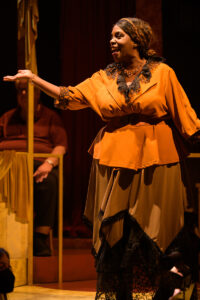
Surrounding these two is an array of characters who each prove to be stellar in their parts, both large and small. As Marya Dmitrievna, Michelle Ianiro brings a voice that bellows a beaming welcome to her goddaughter, Natasha, upon her arrival to Moscow and a voice that later stirs the hairs on one’s neck as she snarls in raspy notes, “You nasty wench of a thing” to a Natasha whom she has discovered was ready to elope with Anatole and betray Andrey (“In My House”). As the loyal cousin, Sonya, Peri Zoe Yildirim-Stanley (the evening’s understudy for the regular Veronica Renner) particularly stands out when she sings a Katie-Lang-sounding ballad, “Sonya Alone,” accompanying herself on guitar. The purity of her voice and notes that gently slide emotionally from one to the other give full credence to a song of friendship that stands out as very different in sound and effect from all the other offerings of the evening.
Semhar Gebrat (another outstanding understudy of the evening, this time for the absent Angel Adedokun) time and again knocks it out of the park as the brassy, barbed, and brazen Hélenè, with moves that strut and swish with no limits as she stirs the sexual arousals of any man near her. And when she sings, her stunning voice carries the biting bitterness she has for most of her fellow humans as well as the desire to always conquer her latest conquest.
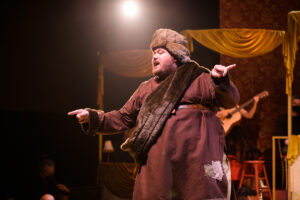
James Mayagoitia is hilarious as the ancient, bent over, totally bitter uncle of Anatole, Old Prince Bolkonsky, who sings with a trembling voice that has not one note of niceness in it; he also makes a significant appearance as the jilted Anatole himself. Boisterous as well as larger than life is Weston Scott as Balaga, a troika driver who leads the entire ensemble in a wild, frenetic, arena-shaking Russian dance and song (“Balaga”).
Another of the evening’s embodiments of evil intent so wonderfully and diabolically captured is Christian Arteaga’s Dolokhov, brother of Hélenè and co-conspirator with her and his best buddy, Anatole. His Dolokhov sings with a venom that drips from his snarling face marked by deep-set eyes so black that there is no sign of the eyeballs themselves.
The evening’s third understudy who – like the others – never shows a hint of actually being a last-minute substitute (this time, for she who is also the evening’s incredible Dance Captain, Danielle Cheiken) is Sarah Elizabeth Williams, playing several parts including the pained, somewhat tormented daughter, Mary, of the Old Prince Bolkonsky.

Missing from the above is Count Pierre Bezukhov, whose own story of a tormented, personal reexamination of his life both runs parallel and intersects the story of Natasha and of his son, Anatole. Albert Hodge introduces upfront his Pierre, singing a powerful confessional of his self-assessed sins, preaching to himself in rich, moving notes full of power, “I can’t go on living as I am.” His proneness to overdrink explodes in a raucous riot of a drinking party, leading him to “The Duel” where music and drums join in his battle of survival. His “Dust and Ashes” is one of the most moving, stunning numbers of the night when he, much like the Biblical Job, cries to God of his regrets and despair with a final plea of “I am ready to wake up” and live again. The mammoth-volume voice, the pained expressions in notes and face, and just the presence Albert Hodge brings to the stage certainly deservedly called for probably the evening’s loudest and most sustained applause.
So many accolades deservedly go to the entire Creative Team. First and foremost, Music Director Daniel Alley not only has orchestrated a mixture of voices long to be remembered but also the seven-piece band he both leads and serves as pianist – a band whose music literally rocks the place the entire evening. Co-directors Patrick Dooley and Eric Mei-Ling Stuart assure never a minute in the two-hour, forty-five-minute evening passes without our being amazed in the parade of bodies dancing, moving among us, appearing in corners and crevices of the theatre while all the time singing in voices so full clarity that I do not think I missed even one lyric the entire night.
The last aspect is also, of course, a huge compliment to Michael Kelly as Sound Designer and Engineer. Nina Ball’s cabaret scenic design that places over half the audience at tables and bars smack-dab in the middle of all the action amidst runways and ramps is a sight to see in order to believe. Jasmine Milan William has designed a plethora of costumes that place us in the early nineteenth century of Russia as well as so cleverly define the personality of each character.
So what else can I say to persuade any reader who has not yet seen this much-extended, much-lauded musical extravaganza to buy a ticket before the final, overhead passing of the finale’s Comet of 1812? It is a celestial phenomenon both in sky and stage that you must not miss.
Rating: 5 E, MUST-SEE
A Theatre Eddys Best Bet Production
Natasha, Pierre & The Great Comet of 1812 continues in extended performances through February 25, 2023, on the Ashby Stage of Shotgun Players, 1901 Ashby Avenue, Berkeley, CA. Tickets are available online at https://www.shotgunplayers.org/ , by phone at 510-841-6500, ext. 303, or by email at boxoffice@shotgunplayers.org.
Photo Credits: Ben Krantz
